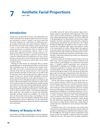iris florentina
Research
20 / 750 results
research The Use of Plants in Hair and Scalp Preparations
Plant-based ingredients in hair care are being replaced by synthetic alternatives.

research Iris Germanica L. Rhizome-Derived Exosomes Ameliorated Dihydrotestosterone-Damaged Human Follicle Dermal Papilla Cells Through the Activation of Wnt/β-Catenin Pathway
Iris-exosomes may help treat hair loss by activating hair growth pathways.

research Seven Aesthetic Facial Proportions
The document concludes that ideal facial proportions are guided by specific measurements and symmetry to enhance beauty, but individual characteristics must be considered.

research Tectoridin Stimulates the Activity of Human Dermal Papilla Cells and Promotes Hair Shaft Elongation in Mouse Vibrissae Hair Follicle Culture
Tectoridin helps human hair cells grow and makes mouse hair longer, suggesting it could treat hair loss.
research Protective Effect of Iris Germanica L. Rhizome-Derived Exosome Against Oxidative-Stress-Induced Cellular Senescence in Human Epidermal Keratinocytes
Iris germanica rhizome-derived exosomes help protect skin cells from oxidative stress and aging.

research New Biomarkers to Evaluate Hyperandrogenemic Women and Hypogonadal Men
The document concludes that hormonal biomarkers are key for diagnosing hyperandrogenemia in women and hypogonadism in men.

research Intraoperative Iris Behavior During Phacoemulsification Maneuvers in Rabbits Treated with Selective Alpha-1 Blocker, 5-Alpha-Reductase Inhibitor, or Anxiolytic Medication
Tamsulosin increases the risk of floppy iris during eye surgery.
research Floppy Iris Syndrome
Tamsulosin increases the risk of floppy iris syndrome during cataract surgery.

research Intraoperative Floppy-Iris Syndrome and Finasteride Intake
Finasteride may cause floppy-iris syndrome during cataract surgery, so check patients' medical history.

research Intraoperative Floppy Iris Syndrome: Management Strategies and Outcomes
Certain eye surgery complications can be managed effectively, especially in patients who have used specific prostate medications.

research Finasteride-Associated Cataract And Intraoperative Floppy-Iris Syndrome
Finasteride may cause cataracts and floppy-iris syndrome.

research Intraoperative Floppy Iris Syndrome: Updated Perspectives
Certain medications and patient factors increase the risk of Intraoperative Floppy Iris Syndrome during cataract surgery, but with careful planning and technique adjustments, complications can be minimized.
research Risk Factors for Intraoperative Floppy Iris Syndrome: A Retrospective Study
Certain medications like α1-blockers, benzodiazepines, and finasteride increase the risk of floppy iris syndrome during cataract surgery.
research Intraoperative Floppy Iris Syndrome: Updated Perspectives
Identifying and managing risk factors before cataract surgery is crucial to prevent complications.
research Research on Intraoperative Iris Behavior in Rabbits Treated with Tamsulosin and Finasteride
Finasteride may increase iris billowing risk during surgery, similar to tamsulosin.
research Is the Sulfonamide Group of Tamsulosin the Main Factor in the Pathophysiology of Floppy Iris Syndrome?
Tamsulosin's sulfonamide group may contribute to floppy iris syndrome.
research A Study of Risk Factors and Predictive Factors in Intraoperative Floppy Iris Syndrome During Phacoemulsification
Certain medications and smaller pupil size increase the risk of intraoperative floppy iris syndrome during eye surgery.
research The Study of Preventing Floppy Iris Syndrome During Age-Related Cataract Surgery
Atropine and neosynephrine effectively prevent floppy iris syndrome during cataract surgery.